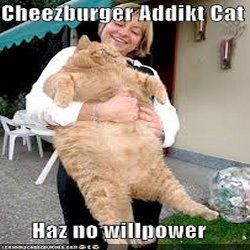Converse with any personal trainer or self-help guru and you will undoubtedly hear that willpower is an important factor in achieving success. Personal trainers are not alone in their beliefs; surveys have found that most Americans consider lack of willpower to be the number one cause of obesity (1). The reality is, however, that this could not be further from the truth.
Despite our innate tendency to blame our actions on intrinsic personal attributes, the vast majority of our behavior is dictated by the environment we are in (2-4). For example, “charitable” people that are in a hurry are much less likely to assist an individual in need of aid compared to “selfish” people that are not under a time constraint (3). Additionally, “selfish” people who are given a map of a food pantry are three times more likely to donate than “charitable” individuals who are not given directions (4).
This phenomenon is not exclusive to exhibitions of altruism; a plethora of research has consistently demonstrated that the environment we are in has a profound influence on the way we eat (5). One study found that secretaries consumed twice as many chocolates when a candy dish was placed on the front of their desk compared to when the dish was placed six feet away (6). This small environmental stimulus led to an extra 200 calories consumed per day, which is enough to cause 20 pounds of fat gain per year.
Clearly, it wasn’t a difference in willpower that caused one group to consume more calories than the other; instead, what mattered was the environment.
Willpower is Unreliable
Many people decide at some point in their lives that over the long term, the benefits of eating healthily or exercising regularly will far outweigh the costs. When making these rational decisions, these individuals are using what neuroscientists refer to as the “Reflective System” (7). This is the neurological decision-making architecture that exhibits self-control because it bases decisions off of what will be favorable over the long term.
The problem, however, is that the Reflective System demands an incredible degree of neural attention, and after a period of time the “Automatic System” will take over (7). Unlike the Reflective System, the Automatic System pays little heed to the long-term effects of its choices and instead is able to minimize neural processing by making quick decisions based off of environmental cues. Shockingly, research has shown that it takes very little stimulus to deplete the brain’s limited supply of self-control and shift power to the Automatic System (8-10).
In one study, participants were required to sit in a room with a bowl of fresh-baked chocolate chip cookies. Half the participants were allowed to eat the cookies, while half were forced to resist the urge. Next, both groups were asked to solve a puzzle (unbeknownst to the participants, the puzzle was unsolvable). Those who had been resisting the cookies gave up twice as quickly due to their depleted supply of self-control (8).
If only a few minutes of resisting fresh cookies is enough to derail the Reflective System, the common stresses of everyday life will undoubtedly ensure that most of our decisions that determine our long-term health will be outside of our conscious control.
Small Environmental Changes Yield Significant Results
In the story “The Odyssey”, Ulysses knew that no amount of willpower could possibly prevent him from steering his crew towards their deaths once he heard the irresistible cry of the Sirens. Rather than rely on self-control, Ulysses modified his environment by instructing his crew to fill their ears with wax and tie him to the mast. Once his Automatic System took over and he lost the ability to think rationally, there was no way that his environment would allow him to make decisions that would lead to his ultimate peril.
In order to make changes in our health, we must utilize the same strategy employed by Ulysses. Rather than rely on willpower, we must find a time when our Reflective System is in charge and use this opportunity to modify our environment so that once our Automatic System inevitably takes over, it will make decisions that coincide with our long-term best interests.
Luckily, even small changes can yield significant results. Taking simple steps, such as using smaller plates (11, 12) or planning and preparing meals in advance (13, 14) can lead to dramatic reductions in daily caloric intake.
Conclusion
While some people may be fortunate enough to find themselves in a setting that naturally promotes a healthy lifestyle, the vast majority of individuals will need to actively modify their environments in order to improve health. Next time you deviate from your diet or miss a workout, resist the impulse to blame a lack of willpower and instead ask yourself what aspects of your environment can be altered in order to increase future success.
References
1 Lee NM, et al. Public views on food addiction and obesity: implications for policy and treatment. PLoS One. 2013 Sep; 8(9): e74836. doi: 10.1371/journal.pone.0074836.
2 Ross L. The intuitive psychologist and his shortcomings: distortions in the attribution process. Advances in Experimental Social Psychology. 1977; 10: 173-220.
3 Darley JM, Batson CD. From Jerusalem to Jericho: a study of situational and dispositional variables in helping behavior. Journal of Personality and Social Psychology. 1973 Jul; 27(1): 100-108.
4 Ross L, Nisbett RE. The person and the situation: perspective of social psychology. Pinter & Martin Ltd. 2011 Dec.
5 Wansink B. Mindless eating: why we eat more than we think. Bantam. 2006.
6 Wansink B, Painter JE, Lee YK. The office candy dish: proximity’s influence on estimated and actual consumption. In J Obes (Lond). 2006 May; 30(5): 871-5.
7 Chaiken S, Trope Y. Dual-process theories in social psychology. The Guilford Press. 1999 Feb.
8 Baumeister RF, et al. Ego depletion: is the active self a limited resource? J Pers Soc Psychol. 1998 May; 74(5):1252-65.
9 Muraven M, Tice DM, Baumeister RF. Self-control as limited resource: regulatory depletion patterns. J Pers Soc Psychol. 1998 Mar; 74(3):774-89.
10 Vohs KD, et al. Making choices impairs subsequent self-control: a limited-resource account of decision making, self-regulation, and active influence. J Pers Soc Psychol. 2008 May; 94(5):883-98.
11 Wansink B, van Ittersum K. The visual Illusions of food: why plates, bowls, and spoons can bias consumption volume. FASEB J. 2006 Mar; 20 (Meeting Abstract Supplement) A618.
12 Wansink B, Cheney MM. Super bowls: serving bowl size and food consumption. JAMA. 2005 Apr 13; 293(14):1727-8.
13 Au N, et al. The cost-effectiveness of shopping to a predetermined grocery list to reduce overweight and obesity. Nutrition & Diabetes. 2013; 3:e77.
14 Kong A, et al. Self-monitoring and eating-related behaviors are associated with 12-month weight loss in postmenopausal overweight-to-obese women. Journal of the Academy of Nutrition and Dietetics. 2012 Sep; 112(9): 1428-1435.


